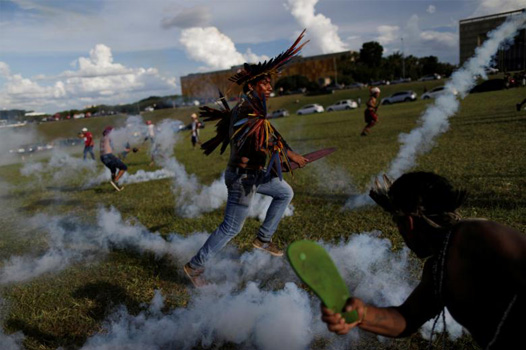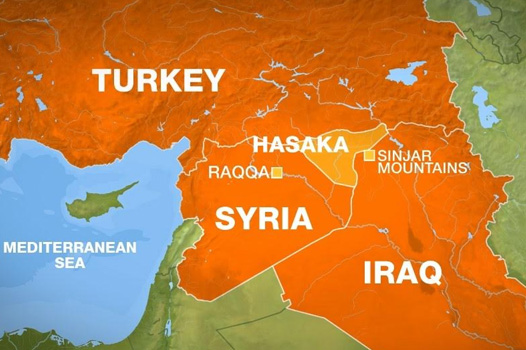|
|
This week in: Peace & Security Publications |
IPSI | Africa | Americas | East Asia | Middle East | South Asia
|
|
|
|
|
This week in Peace & Security Publications
|
|
|
|
|

Transforming Violent Extremism
Transforming violent extremism recognizes that while violent extremism exists, the reasons and motivators leading to an individual being drawn to violent extremist movements can be transformed into a different type of agency or engagement.
|
|

Nations in Transit 2017: The False Promise of Populism
Nations in Transit is Freedom House’s research project on democracy in the 29 formerly communist countries from Central Europe to Central Asia.
|

Refugee Compacts: Addressing the Crisis of Protracted Displacement
The world is witnessing higher levels of displacement than ever before. The statistics tell the story.
|
|
|
|
|
|
|
IPSI Summer Symposiums in Bologna and Sarajevo. Spots filling quickly, apply online now.
|
|
|
|
|
This week in Sub-Saharan Africa
|
|
|
|
|
KENYA: Primary elections spur violence
On Wednesday, one death was reported amid election-related violent clashes flaring in 12 of Kenya’s 47 counties; primary elections opened on April 13. In Homa Bay County, police fired teargas to disperse hundreds of protesters that were angered by the reelection of the governor. In Nairobi, youth stormed a building that served as a repository for ballot papers in an attempt to prevent rigging. In several counties, the elections are currently being repeated after the ruling party annulled their results last Friday due to claimed shortages of materials. Comment: More than 1,000 were killed in electoral violence following the 2007 presidential election. The high levels of violence around the primary vote has raised concerns among election observers about the presidential and parliament votes on August 8. (Daily Nation 1, 2, The Star, AP, Reuters 1, 2)
|
|
|
|
|
|
SOUTH SUDAN: New fighting displaces thousands
On Tuesday, the South Sudanese government launched a new offensive in the town of Kodok displacing 25,000 residents to a nearby town, according to Doctors Without Borders. The offensive, reported as one of the most significant so far this year, was launched one day after U.S. Ambassador Haley urged the UN Security Council to impose an arms embargo and additional sanctions on South Sudan to pressure parties to end the civil war. Both Russia and China oppose the US proposal. Comment: The attack on Kodok follows a series of government offensives across the country, putting into question the legitimacy of the 2015 peace agreement and confirming UN envoy Shearer’s recent statement that no parties have shown interest in abiding by the ceasefire agreement. (AfricaNews, AP 1, 2, Reuters)
|
|
|
|
|
REGIONAL: WHO launches first malaria vaccine program
On Monday, the World Health Organization Regional Office for Africa announced its 2018 launch of a pilot malaria vaccination initiative in selected areas of Ghana, Kenya, and Malawi. The injectable vaccine will be administered to more than 750,000 children. According to the WHO regional director for Africa, in combination with existing interventions, the vaccine will “have the potential to save tens of thousands of lives in Africa.” Comment: Although global efforts between 2000 and 2015 have reduced malaria deaths by 62 percent, approximately 430,000 people died from the disease in 2015, the majority of which were young children in Africa. (AllAfrica, Al Jazeera, BBC, WHO)
Researched/Written by Jessica Himelfarb
|
|
|
|
|
|
This week in the Americas & Caribbean
|
|
|
|
|
BRAZIL: Indigenous peoples protest turns violent in Brasilia
 |
|
On Tuesday, 4,000 indigenous peoples and supporters marched to the National Congress in Brasilia demanding respect for their rights and protesting against a law that would determine land boundaries for indigenous reservations. President Michel Tamer’s government is being accused by the indigenous peoples organizations of profiting from the sale of protected land in the Amazon. The demonstration was nonviolent until the Brazilian Military Police began firing rubber bullets and tear gas at the protesters, while tribe members shot arrows and threw lances in retaliation. No official report on the number of people injured or arrested has been published yet. Comment: Brazil is home to several indigenous tribes living in the Amazonian region. According to the Brazilian Association of Indigenous Peoples (APIB) clashes over access to resource-rich reserves between indigenous groups, land owners, and different companies are not uncommon, claiming dozens of lives each year. (O Globo, El Nuevo Herald, El Pais, Telesur 1, 2, BBC, NBC)
|
|
|
|
|
|
COLOMBIA: ELN releases hostages
On Tuesday, the National Liberation Army (ELN), the last active guerrilla group in Colombia, freed two hostages kidnaped in March. The hostages, Freddy Alexander Chaverra and Leidy Viviana Betancourt were released to the International Committee of the Red Cross (ICRC). Representatives from Cuba, Ecuador, and Norway participated in the operation, as part of a group of six countries sponsoring the dialogue process between the guerrilla group and the Government. Comment: Since February 2017, the ELN have participated in talks seeking to negotiate a peace deal, similar to the one reached with the Revolutionary Armed Forces of Colombia (FARC). Negotiations have stagnated since the ELN leadership refuses to renounce kidnapping activities. (Infobae, El Nuevo Herald, El Pais, La Prensa)
|
|
|
|
|
|
VENEZUELA: Process begins to withdraw from the Organization of American States
On Wednesday, the Organization of American States permanent council voted to convene a meeting of foreign ministers to discuss the situation in Venezuela, with 19 votes in favor, 10 against, one abstention and one absence. A few hours later, the Venezuelan Foreign Minister Delcy Rodriguez announced that the country will begin the process of exiting the OAS, accusing the group of meddling in Venezuela’s internal affairs. Comment: The decision to hold a special meeting came to be after a month of continuous protest and demonstrations against the government of President Maduro. According to the Venezuelan Public Ministry, 29 people have died as a result of protests. (El Nuevo Herald, Telesur 1, 2, CNN, BBC 1, 2)
Researched/Written by Silvina Zbikoski
|
|
|
|
|
This week in East Asia & Pacific
|
|
|
|
|
CHINA: First domestically built aircraft carrier launched
On Wednesday, China launched its first domestically built aircraft carrier, which will join the existing aircraft carrier China bought from Ukraine and commissioned in 2012. Construction of the new 50,000-ton carrier began in 2015, and the carrier is expected to be commissioned before 2020, after undergoing sea trials and completion of its air complement. Much like China’s first aircraft carrier, the Soviet-built Liaoning, the new aircraft is based on Soviet Kuznetsov class design. Comment: At least two more aircraft carriers are believed to be planned and are expected to be modeled after U.S. aircraft carriers, which will allow them to carry more fuel and weapons. China’s maritime interests include assertiveness in the South China Sea and increased naval power that would reflect China’s international status. (China Post, Xinhua Net, Al Jazeera, BBC, The Guardian)
|
|
|
|
|
|
JAPAN: Warships join U.S. Navy strike group
On Sunday, two Japanese destroyers joined the U.S. Navy carrier strike group in the Philippine Sea and carried out bilateral exercises. The group is headed north of the Sea of Japan and is meant to demonstrate U.S. resolve in the region in response to North Korea’s continued development of offensive ballistic missiles with nuclear capability. Since its deployment in January, the U.S. Navy strike group has cooperated with the Japanese warships four times, most recently during military exercises in late March. Comment: Despite geopolitical tensions in the region, a press release issued on Saturday stated that the exercises were routine and made no mention of North Korea, which has threatened to destroy U.S. military assets as well as those of Japan and South Korea. (The Diplomat, Defense News, Newsweek, The Guardian)
|
|
|
|
|
|
SOUTH KOREA: Missile defense system deployed
On Wednesday, U.S. troops began delivering a missile defense system known as Terminal High Altitude Area Defense (THAAD) system to a deployment site in South Korea. The deployment of the system was agreed to last year and is planned to be fully installed by the end of 2017. Hundreds of residents protested against the deployment, some clashing with police resulting in 10 injuries and the hospitalization of three protesters. Comment: THAAD is designed to intercept and destroy ballistic missiles during their final phase of flight and is intended to guard against missile threats from North Korea. THAAD deployment comes as tensions in the region rise following a number of missile tests conducted by the North. (Channel News Asia, The Japan Times, Reuters)
Researched/Written by Kanstantsin Ivanou
|
|
|
|
|
|
This week in Europe & Central Asia
|
|
|
|
|
CYPRUS: Proposed Turkish nuclear plant causes protests
On Wednesday, around 100 Turkish and Greek Cypriot activists linked arms to form a human chain in protest of Turkey’s proposed nuclear plant. The protest occurred on the 31st anniversary of the Chernobyl nuclear facility disaster, and took place along the buffer zone controlled by the UN. Activists are concerned about a potential nuclear disaster, particularly among claims that the nuclear plant would lay atop an active seismic zone. They also stress the negative impact the plant may have on local wildlife through exposure to waste materials and raising nearby sea temperatures. Comment: Cyprus has been divided between a northern ethnic Turkish state and a southern Greek state since 1974. The Greek and Turkish Cypriot leaders were engaged in peace talks considering reunification since May 2015, which have stalled for two months but were rebooted on April 11. (CyprusMail, NZME, AP)
|
|
|
|
|
|
RUSSIA: Prosecutor bans Khodorkovsky-backed NGOs
On Wednesday, Russia banned three NGOs backed by the exiled Russian businessman Mikhail Khodorkovsky, who was convicted of fraud charges in 2003 after criticizing the Kremlin and pardoned by President Vladimir Putin in 2013. The organizations include the UK based NGO Open Russia, the U.S. based Institute of Modern Russia, and the local Open Russia Civic Movement. The Kremlin called the organizations “undesirable” after Open Russia called for an anti-government protest last Saturday, to occur on April 29. Entities on Russia’s list of undesirable organizations are banned from publicizing information in the country, may have their assets frozen, and it is illegal for other individuals to cooperate with them. Comment: All three NGOs operate primarily in Russia, and are primarily run by Russians. The ability to ban the organizations comes from a 2015 law allowing prosecutors to declare foreign-registered organizations as undesirable and shut them down. It is unclear whether this law applies to the Russia based Open Russia Civic Movement. (Amnesty International, RFE/RL, DW, AP)
|
|
|
|
|
TURKEY: Aerial attacks against Kurdish operations
|
 |
On Tuesday, Turkey bombed Kurdish militants fighting the self-proclaimed Islamic State in both Syria and Iraq, leaving at least 70 militants dead. On Wednesday, the Kurdish militia retaliated by firing upon four Turkish outposts along the Syrian border with mortar shells and artillery. Turkey responded with renewed aerial bombings killing six additional Kurdish militants. Both the U.S. and Russia have condemned Turkey’s attacks against the Kurdish militants, arguing they undermine common efforts against the self-proclaimed Islamic State. Comment: Many of the Kurdish forces targeted are members of the U.S. backed People’s Protection Unit (YPG) who have been closing in on the self-proclaimed Islamic State in Raqqa. Turkey alleges the YPG to have ties with the Kurdistan Workers’ Party (PKK), which it considers a terrorist organization. Russia is a close ally of the Syrian government, while Turkey officially backs the Syrian opposition. (Kurdistan24, Reuters 1, 2, AP)
Researched/Written by Kenneth Davis
|
|
|
|
|
|
This week in the Middle East & North Africa
|
|
|
|
|
ISRAEL/SYRIA: Israeli rockets hit arms depot in Damascus
On Thursday, five rockets fired from Israel hit an arms yard operated by Hezbollah in Damascus, causing an explosion near the Damascus airport. While the Israeli military has declined to comment, Israeli Intelligence Minister Israel Katz, confirmed the strikes were carried out to prevent Iran from smuggling weapons to groups in Syria. The arms depot supplied arms to a variety of Iranian armed groups, led by Hezbollah, fighting Syrian rebels. Comment: Israeli Prime Minister Benjamin Netanyahu has previously stated that whenever Israel receives intelligence on a potential transfer of weapons to Hezbollah, they will act. In January, Israel targeted the Mezze military airbase, a few kilometers from the presidential palace, to which the Syrian government warned they would retaliate. (Al Jazeera, Haaretz, The Jerusalem Post)
|
|
|
|
|
|
JORDAN: Cabinet passes vote to abolish rapist-marriage law
On Sunday, after months of heated debate, the cabinet of the Jordanian government voted to abolish Article 308 of the Penal Code, which allows the pardon of rape perpetrators if they marry their victims. For the law to be abolished, the Jordanian Parliament must also debate and vote in favor of its removal. It is uncertain if the law will be abolished as there are deep divisions on the issue among the deputies of parliament. Comment: The vote of the cabinet comes after a royal committee, established by Jordan’s King Abdullah II to review and reform the law, recommended abolishing the article in February. On May 15, the Lebanese parliament is expected to vote on eliminating their version of the same law. Jordan and Lebanon would be joining Morocco, who abolished the same law in 2014. (The Jordan Times,Petra News Agency, Al Jazeera)
|
|
|
|
|
|
SYRIA: U.S. air strikes kill civilians fleeing Raqqa
On Tuesday, a suspected U.S.-led coalition airstrike killed at least 11 people fleeing fighting between U.S.-backed forces and the self-proclaimed Islamic State in Tabqa, in the Raqqa province. The airstrikes support the Syrian Democratic Forces (SDF), who captured the southern part of the city and are locked in battle with the self-proclaimed Islamic State for the remainder. Comment: The Raqqa province was taken by the self-proclaimed Islamic State in January 2014 from al-Qaeda’s former affiliate in Syria, along with Tabqa’s airbase from the Syrian government in August 2014. The SDF captured the strategic Tabqa airbase last month. SDF was founded in Syria’s Kurdish region in October 2015 and consists of approximately 15 armed factions, including fighters from the Kurdish People’s Protection Units and the Free Syrian Army. (Al Jazeera, Al-Masdar News, ABC News)
Researched/Written by Raghda Karajah
|
|
|
|
|
|
AFGHANISTAN: Defense minister and army chief of staff resign
On Monday, the Presidential Palace confirmed the resignation of Defense Minister Abdullah Habibi and Army Chief of Staff Qadam Shah Shahim, after the Taliban killed more than 130 in a deadly attack on an Afghan base on Friday. Taliban members dressed in army uniforms infiltrated the compound of the 209th Corps of the Afghan National Army in the largest attack yet on a military base to be executed by the Taliban. Since the attack, there have been calls for the officials’ resignation on social media, in local media, and amongst protestors who took to the streets. Comment: The defense ministry has reported that all of the involved attackers have been killed. Analysts say the attack highlights the continuous failure of military intelligence in Afghanistan. (ToloNews, Al Jazeera, BBC)
|
|
|
|
|
INDIA: Maoist rebels attack soldiers, kill 25
On Monday, in a remote area of central India, more than 300 Maoist insurgents ambushed paramilitary forces deployed to guard the construction of a road through Sukma, a stronghold for the Maoists. Indian officials believe the attack aimed to thwart the construction of the road, which will provide security forces more mobility through the region. Comment: The attack is the most severe to be carried out by the rebels in the past seven years. Maoist rebels have been fighting against the government in the area for more than three decades claiming to protect the rights of tribal people and farmers who are opposed to the increased mining in the mineral-rich region. (Hindustan Times, Times of India, Al Jazeera)
|
|
|
|
|
|
MALDIVES: UN calls for investigation into killing of famed blogger
On Monday, the High Commissioner for Human Rights Zeid Ra’ad Al Hussein denounced Sunday’s killing of Yameen Rasheed, a liberal blogger who spoke out against the nation’s politicians. The government has launched an investigation and called for information that could lead to the arrest of the perpetrators. Rasheed’s parents have called for the inclusion of international investigators into the police inquiry, saying that the investigation will only be credible if members of reputable international organizations are involved. Comment: Rasheed’s murder comes during an upsurge of arrests and prosecutions of the political opposition. Maldives ranks 117th out of 180 countries on the Reporters Without Borders’ annual press freedom index. (Maldives Independent 1, 2, Al Jazeera, International Business Times)
Researched/Written by Kaleigh Thomas
|
|
|
|
|